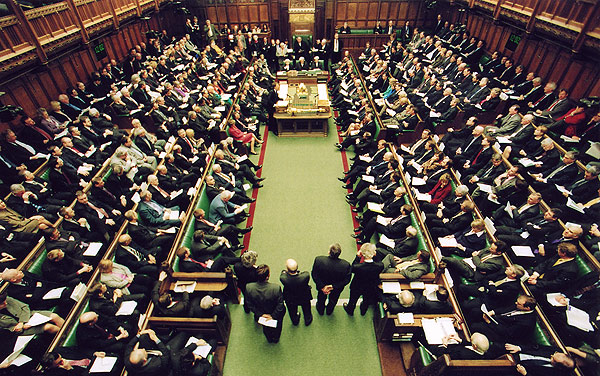
Citizens should have the power to call constitutional conventions
There is much debate about the need for a constitutional convention for the UK. The case for a convention is strong: the constitutional settlement is currently in flux with cross-party agreement to devolve further powers to Scotland; the Welsh and Northern Irish assemblies want enhanced powers; and there are calls for devolution to the regions and cities within England and/or an English parliament. Older constitutional issues such as the voting system and the future of the House of Lords remain unresolved. A great deal of ink is being spilled on the question of what form any convention should take. A concern that a new settlement will be a stitch-up amongst the major political parties and the vibrancy of the referendum …

What would a constitutional convention for the UK look like?
In the wake of the Scottish referendum, the idea of a constitutional convention is gaining popularity. It appeals to the public and the Conservatives are now the only major party resisting a convention in principle. However, as has been discussed on the UCL Constitution Unit blog, the process of realising a convention that can deliver subsequent reform is likely to be fraught with difficulties. If Labour, the Liberal Democrats, the Greens or the SNP were pushed to define the nature and purpose of a UK constitutional convention, it is almost certain that any consensus would fall apart very quickly. At a recent Constitution Unit seminar, Dr Alan Renwick, Reader in Politics at Reading University and author of After the Referendum: Options for …

Valorised and Vilified: What Do ‘Citizens’ Do? Initial Linguistic Reflections
It is clear that debates about ‘who’ citizens are (as well as normative claims about who they ‘should’ be) are important to understanding the politics of citizenship. However, reflecting on the remit of this special series on ‘Migration and Citizenship’, another fundamental question occurred to me: what do citizens do? Describing the kinds of actions and activities in which citizens—however we may define them—reportedly engage could open further discussion about the nature of citizenship itself.
In my current work with the Centre on Migration, Policy, and Society (COMPAS), I focus on the ways that British newspapers talk about migration issues and relate these narratives to public perceptions and migration policy changes. Using techniques from corpus and computational linguistics, which enables researchers to analyse large amounts of text, I look for (ir)regularities and significant patterns of words. These contextual patterns, called ‘collocations’, can provide insight into a concept: one of the major contributors to linguistics, John Firth, famously expressed this feature of language when he said ‘you shall know a word by the company it keeps’. Applying Firth’s guiding principle to study of UK press portrayal of migrant groups reveals that, in the case of immigrants and asylum seekers, their company is relatively negative. Dr Scott Blinder and I showed that from 2010-2012, the British national press most often described ‘immigrants’ as ‘illegal’ while portraying ‘asylum seekers’ as ‘failed’.
But what about citizens? What does this group of people reportedly do in the context of migration coverage?

Tilling the fields where forced labour grows
Unless you are following the story closely, you may not have noticed the worryingly slow progress of the “Modern Slavery” bill through parliament. It faces its third reading in early November, and so far there is no outright opposition. Of course no one is going to speak up for modern slavery. It is a dreadful thing, and no parliamentarian would defend it for a moment.
Instead, the delays have come from wrangling over wording, caused by the politics over immigration. The problem is that Home Secretary Theresa May describes the crime as “human beings used as commodities for the personal gain of others” (Hansard, 8 July 2014 col. 166), provoking the question of how this form of exploitation differs from other “everyday” exploitation faced by many (if not most) workers.

Events in Iceland show that a UK constitutional convention should involve politicians as minimally as possible
After the financial crash of 2008, Iceland’s prospects looked promising in two respects. First, the government decided to call the IMF to the rescue following the Central Bank’s botched attempt to get Putin’s Russia to protect Iceland from the IMF’s ‘Kiss of Death’. The Fund-supported recovery program served Iceland well. Second, up against the wall, Parliament gave in to the demands of the ‘Pots and Pans Revolution’, including the protesters’ demand for a new constitution to be drawn up by the people, not by politicians or their lawyers. From 1944, when Iceland adopted what was essentially a translation of the Danish constitution from 1849, Parliament had consistently failed to keep its promise of constitutional reform. Without the crash, there would …

Alternatives to fixed-term elections
Until the present coalition government introduced the Fixed-term Parliaments Act, in 2011, the UK Prime Minister had discretion to call elections at will, a power often used for partisan advantage. As Petra Schleiter reports in her recent post on Politics in Spires, 60% of the UK’s post-war elections were called early (i.e. more than six months before required). Further, her analysis suggests that this gave incumbents a 6% vote gain, roughly doubling the PM’s chances of remaining in office.
The Fixed-term Parliaments Act allows early elections to be called only in very restricted circumstances (either with support of two-thirds of the House of Commons or following a vote of no confidence after which no alternative government is approved by the Commons within 14 days). Schleiter points to a number of advantages of this; not only does it stop PMs from calling elections opportunistically, in order to increase their chances of victory, but depriving them of this power also prevents them from using the threat of an election to bully backbench MPs or coalition partners, thereby making the government more accountable to parliament.
However, in focusing on the advantages of fixed-term elections, Schleiter does not consider whether there are certain advantages to the old system, in which an election could be called at any moment.

Why the Fixed-term Parliaments Act should not be repealed
The Coalition introduced the Fixed Term Parliaments Act in 2011. Now some Conservative MPs want to repeal the Act. But Fixed Term Parliaments are good for UK democracy and the Act should stay. When the current coalition government introduced the Fixed-term Parliaments Act in 2011, the case appeared compelling: The Government believes that fixed-term Parliaments will have a positive impact on our country’s political system; providing stability, discouraging short-termism, and preventing the manipulation of election dates for political advantage. (“Government response to the report of the House of Lords Constitution Committee on the Fixed-term Parliaments Bill”, 2011, Introduction) Now Tory MPs have changed their minds. This week a group of Tory backbenchers have been mounting a campaign to repeal the …

Immigration controls and their effects on citizenship
UKIP’s recent by election victory proves it: the public are extremely worried about immigration and its impacts on labour markets and communities. The pressure is increasing on politicians of all parties to ‘do something’ about immigration.
But this is nothing new. A quick look at immigration laws in the last decade suggests that there has been no shortage of efforts to do something. The most recent Immigration Act 2014 is the fourth major Act in ten years, and the eighth since 1996. During its nine years in office, Labour created eighty-four new immigration offences (Aliverti 2012). These laws have had significant consequences for non-citizens, consequences that have been the subject of interest across a wide range of social science disciplines.
Often forgotten, though, are the consequences for citizens and the idea of citizenship. Our blog series on migration and citizenship hopes to address this omission.









